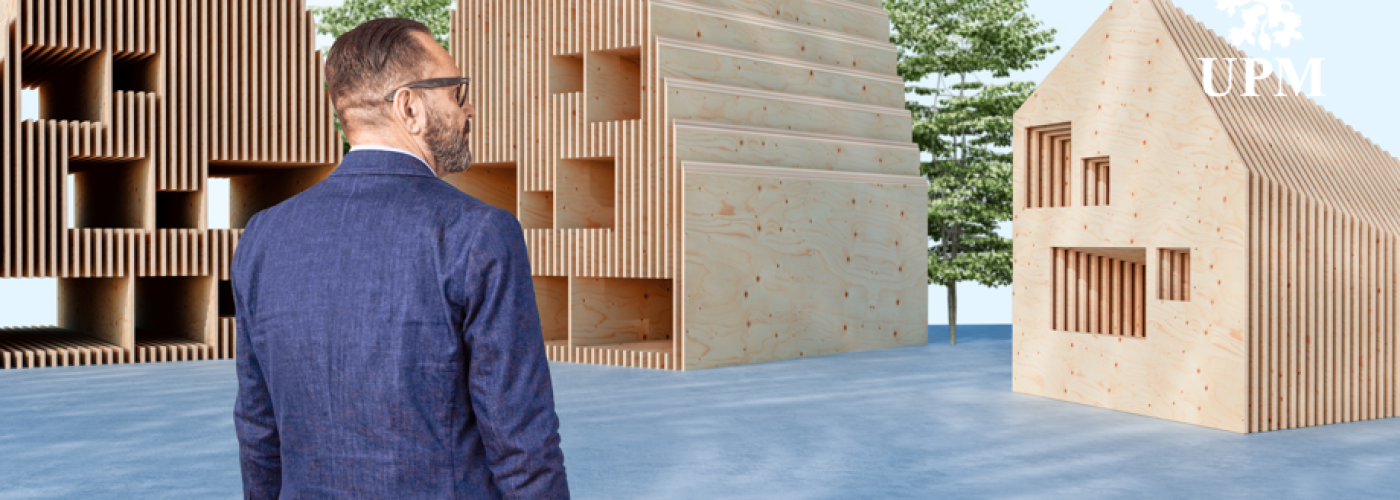UPM’s ultra-sustainable new technology, WISA BioBond, becomes standard bonding agent in all James Latham Ltd’s collection of UPM WISA-Spruce.
Today, James Latham Ltd (Lathams), one of the UK’s leading independent distributors of panel products, announces the introduction of WISA®’s new BioBond technology to its full range of WISA-Spruce plywood.
WISA BioBond is the latest bonding innovation from UPM, a globally-renowned manufacturer of sustainable architectural plywood, now used in the entire WISA-Spruce range.
A landmark development in plywood adhesive, BioBond replaces at least 50% of standard glue’s fossil-based phenol with lignin, timber’s inherent bonding agent.
Obtained as a by-product of the Kraft Process[1], this partial-substitution reduces the carbon footprint of WISA-Spruce by approximately 10%, without compromising technical performance or visual appeal.
No compromise on performance
WISA-Spruce is manufactured using UPM’s proprietary BioBond technology, and mirrors the qualities of plywood produced using the traditional higher-carbon bonding method. This means it offers a like-for-like greener alternative.
As with all WISA’s plywood, WISA-Spruce with BioBond technology has undergone rigorous testing to guarantee its high performance qualities, meeting superior standards of strength, resistance and sustainability.
Forming a strong and sustainable bond
More than just a new form of glue, BioBond has reduced CO2 WISA’s plywood portfolio, Already available for birch, and now spruce, plywood, UPM plans to roll out BioBond across all its plywood mills, gradually covering its entire range.
As one of the UK’s most sustainable materials distributors, Lathams is keen to introduce UK specifiers to the low-carbon advantages of WISA-Spruce with BioBond technology. By incorporating this innovation to its ever-expanding collection of green architectural materials, they are demonstrating their ongoing commitment to supporting sustainable design and build.
Commenting on the introduction of BioBond to the WISA-Spruce range, Nick Widlinski, Panels Director at Lathams says, “There’s no doubt timber and wood-based materials are helping architects and designers tackle global climate change through making lower-emission material choices. However, a question around the carbon intensity of glues and adhesives used in the production of engineered wood persists, and WISA BioBond tackles it head on. Its introduction and standardisation across the brand’s high-performance spruce range is a game-changer, offering the best quality with a reduced carbon footprint. Not only is it helping us to promote more sustainable construction methods, it’s also supporting a wider drive toward a Net Zero society.”
UPM’s VP of Strategy and Business Development, Susanna Rinne, concludes, “Sustainability is at the heart of our ethos and guides our ongoing R&D. We are the first manufacturer in the world to use a lignin-based solution for spruce and birch plywood, offering a no-compromise sustainable material solution. It’s imperative we work with those who have similar values. Due to Lathams’ longstanding reputation for championing sustainable specification make them a great partner to help us introduce BioBond and its unique properties to the UK and Irish markets.”
Providing further confidence in WISA-Spruce’s green credentials and certification, the product category scored one of the best ratings on Lathams’ new Carbon Calculator tool. An academically developed formula which scores the embodied carbon of each Lathams’-stocked timber product from cradle-to-purchase, BioBond WISA-Spruce achieved top ranking across the board, providing third party verifications for the material’s sustainability claims.
To find out more about BioBond, WISA-Spruce and UPM’s wider collection of WISA plywood, click here.
To discover Latham’s wide range of materials, and realise the potential for almost any design preference or requirement, click here.







